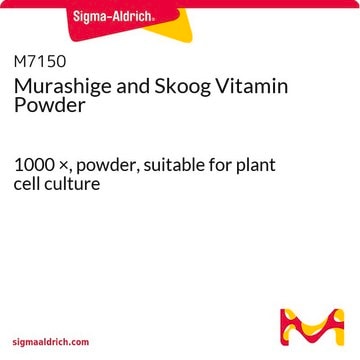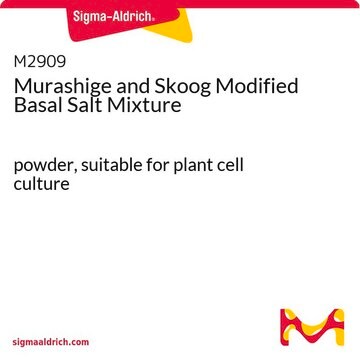M5524
Murashige and Skoog Basal Salt Mixture (MS)
powder, suitable for plant cell culture
Synonyme(s) :
MS Basal Salts, MS0 Basal Salts, MSO Basal Salts
Se connecterpour consulter vos tarifs contractuels et ceux de votre entreprise/organisme
About This Item
Code UNSPSC :
12352207
Nomenclature NACRES :
NA.72
Produits recommandés
Forme
powder
Niveau de qualité
Technique(s)
cell culture | plant: suitable
Application(s)
agriculture
Conditions d'expédition
ambient
Température de stockage
2-8°C
Description générale
Murashige and Skoog medium is a widely used plant tissue culture growth medium. M&S Basal Medium contains macronutrients that include high levels of nitrate and organic additives such as agar, sugars, vitamins and growth regulators. Important growth regulators frequently added to M&S include IAA (auxin/morphogen) and Kinetin (cytokinin/cell division promoter).
Application
Murashige and Skoog Basal Salt Mixture (MS) has been used to support the growth and regeneration of transformed tobacco cells. It has also been used as a growth medium for germination of Arabidopsis thaliana (Col-0) seeds.
Variante de formule
Quantité
Formulated to contain 4.3 grams of powder per liter of medium.
Notes préparatoires
Murashige and Skoog medium can be reconstituted from powder or by combining products that are major components of complete M&S medium, such as macronutrient mixtures and vitamin mixtures. Murashige and Skoog Salt mixture (M5524) contains the macronutrients and micronutrients of the original classic formulation. It can be combined with M&S vitamins or Gamborg′s vitamins and supplemented with sucrose, agar, auxins (IAA) and cytokinins (Kinetin) to generate a complete medium for growth plant tissue culture.
Autres remarques
Storage
Powdered media are extremely hygroscopic and must be protected from atmospheric moisture. If possible the entire contents of each package should be used immediately after opening.
Store dry medium in a desiccator at 0-5 °C.
Deterioration of powdered medium may be recognized by: 1) color change; 2) granulation, clumping, or particulate matter throughout the powder; 3) insolubility; 4) pH change; or 5) inability to promote growth when properly used.
Media Preparation
Powdered media are extremely hygroscopic and must be protected from atmospheric moisture. If possible the entire contents of each package should be used immediately after opening.
Store dry medium in a desiccator at 0-5 °C.
Deterioration of powdered medium may be recognized by: 1) color change; 2) granulation, clumping, or particulate matter throughout the powder; 3) insolubility; 4) pH change; or 5) inability to promote growth when properly used.
Media Preparation
Produit(s) apparenté(s)
Réf. du produit
Description
Tarif
Mention d'avertissement
Warning
Mentions de danger
Conseils de prudence
Classification des risques
Eye Irrit. 2 - Ox. Sol. 3
Code de la classe de stockage
5.1B - Oxidizing hazardous materials
Classe de danger pour l'eau (WGK)
WGK 1
Point d'éclair (°F)
Not applicable
Point d'éclair (°C)
Not applicable
Certificats d'analyse (COA)
Recherchez un Certificats d'analyse (COA) en saisissant le numéro de lot du produit. Les numéros de lot figurent sur l'étiquette du produit après les mots "Lot" ou "Batch".
Déjà en possession de ce produit ?
Retrouvez la documentation relative aux produits que vous avez récemment achetés dans la Bibliothèque de documents.
Les clients ont également consulté
Pyae Phyo et al.
Plant physiology, 175(4), 1593-1607 (2017-11-01)
At early stages of Arabidopsis (
Tohru Ariizumi et al.
The Plant cell, 20(9), 2447-2459 (2008-10-02)
This article presents evidence that DELLA repression of gibberellin (GA) signaling is relieved both by proteolysis-dependent and -independent pathways in Arabidopsis thaliana. DELLA proteins are negative regulators of GA responses, including seed germination, stem elongation, and fertility. GA stimulates GA
Chien-Yu Huang et al.
Plant physiology, 174(4), 2248-2260 (2017-06-15)
Plant cytosolic lipid droplets (LDs) are covered with a layer of phospholipids and oleosin and were extensively studied before those in mammals and yeast. Oleosin has short amphipathic N- and C-terminal peptides flanking a conserved 72-residue hydrophobic hairpin, which penetrates
Joanna Banasiak et al.
Frontiers in plant science, 11, 18-18 (2020-03-03)
Strigolactones (SLs) are plant-derived signaling molecules that stimulate the hyphal branching of arbuscular mycorrhizal fungi (AMF), and consequently promote symbiotic interaction between the fungus and the plant. Currently, our knowledge on the molecular mechanism of SL transport is restricted to
Long Xiao et al.
BMC plant biology, 20(1), 292-292 (2020-06-27)
Starch is synthesized during daylight for temporary storage in leaves and then degraded during the subsequent night to support plant growth and development. Impairment of starch degradation leads to stunted growth, even senescence and death. The nuclear pore complex is
Notre équipe de scientifiques dispose d'une expérience dans tous les secteurs de la recherche, notamment en sciences de la vie, science des matériaux, synthèse chimique, chromatographie, analyse et dans de nombreux autres domaines..
Contacter notre Service technique











